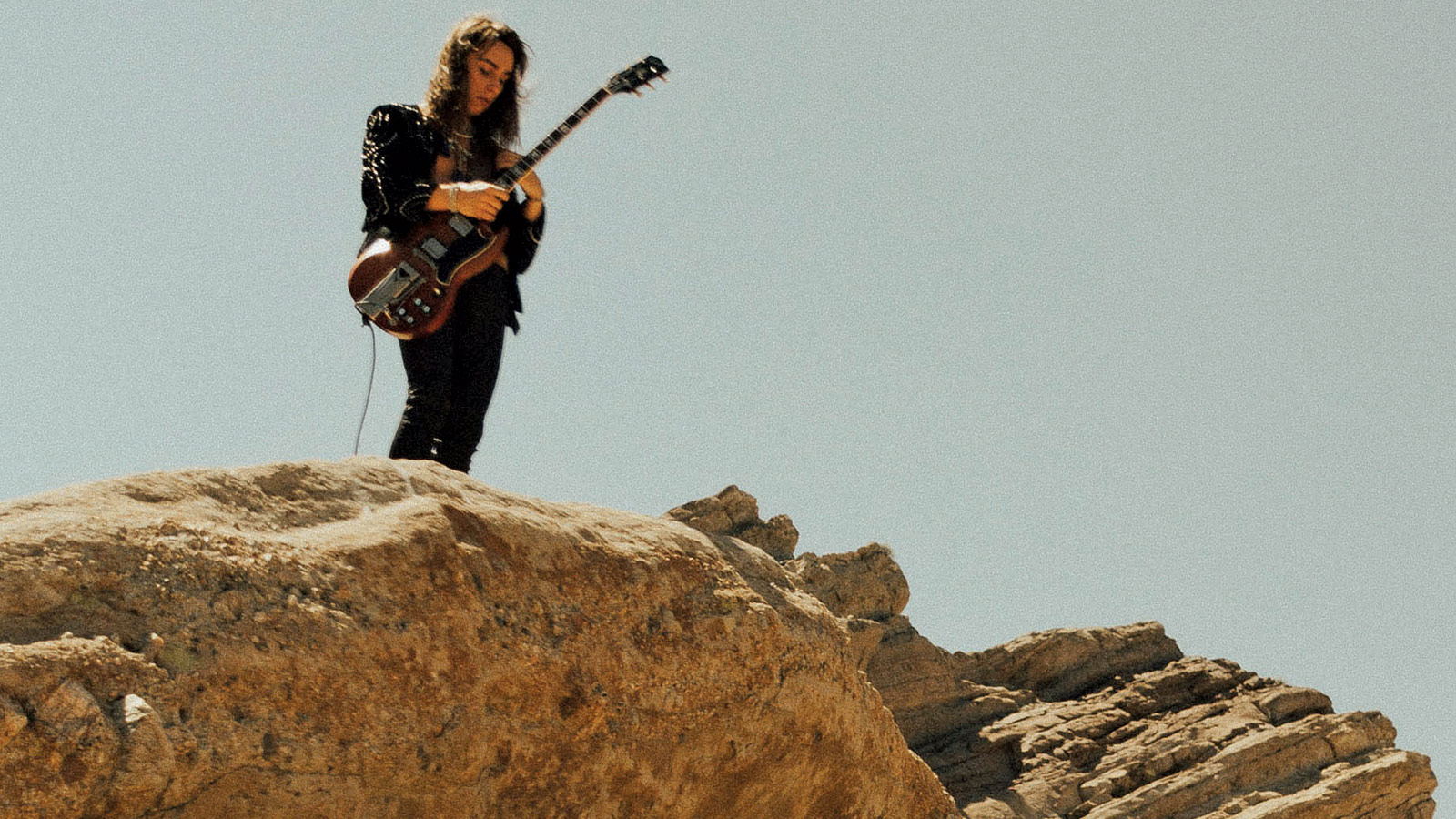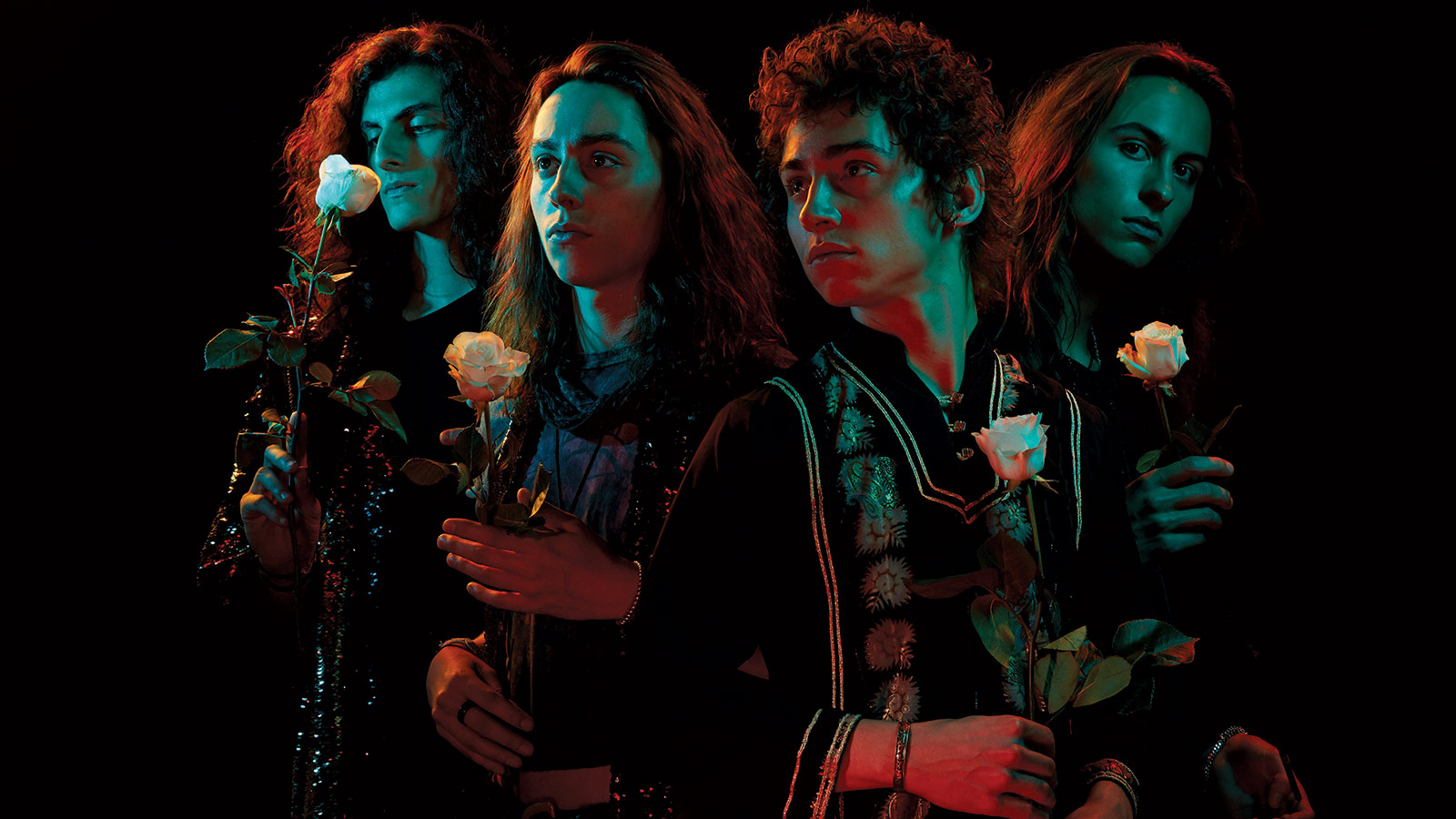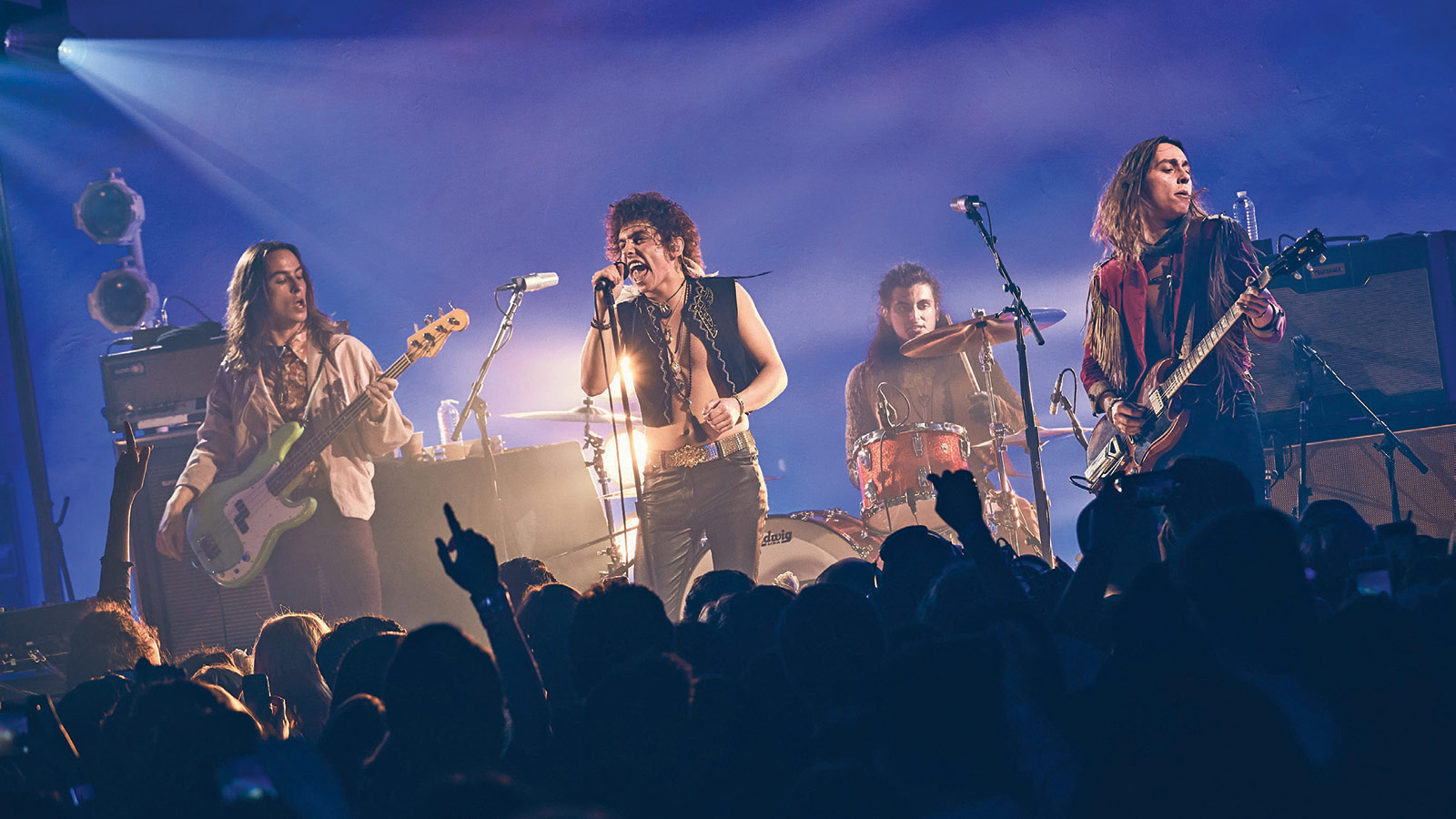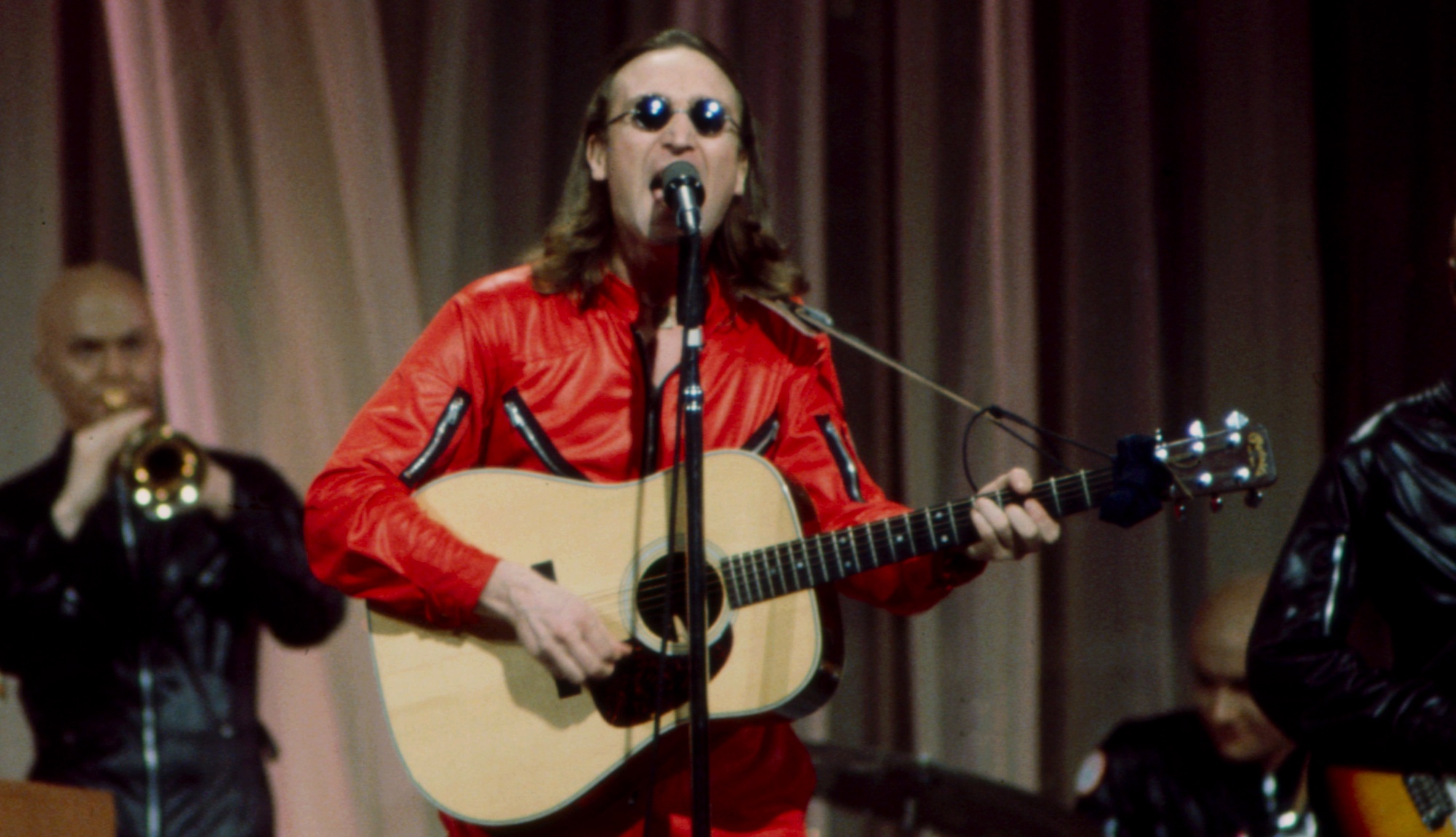
All the latest guitar news, interviews, lessons, reviews, deals and more, direct to your inbox!
You are now subscribed
Your newsletter sign-up was successful
“Greta Van Fleet are the saviors of rock and roll.” For much of the past year and a half, guitarist Jake Kiszka has been hearing that phrase over and over. While such a line might seem like little more than a well-worn cliché thrown about willy-nilly by jaded music journalists desperate for something — anything — to champion in the way of genuine, guitar-based rock, in the case of Greta Van Fleet, there might be some actual meat on the bone.
Consider the evidence: The Michigan- based group’s first two EPs, Black Smoke Rising and From the Fires, packed rowdy, rifftastic doozies such as “Highway Song” and “Safari Song” that shot to the top of Billboard’s Mainstream Rock charts. Radio buzz soon translated to sales (each EP moved more than 100,000 units), and in no time at all the band were headlining shows and receiving rapturous reviews on both sides of the Atlantic. All of which causes one to ask Kiszka the question: Are Greta Van Fleet, in fact, the “saviors of rock and roll”?
“Boy, I don’t know,” Kiszka answers with a laugh. “It’s a heavy crown to wear, isn’t it? You hear that and you think, ‘Can one band can have it all to themselves?’ The thing is, rock and roll has been around for decades and a lot of artists contributed to it along the way. Some of what once was doesn’t exist anymore, but that’s the thing: It always changes, and so I think it’ll always exist in some way. We’re honored and humbled by people’s reactions, and we’re happy to continue a tradition. Whether that’s ‘saving rock and roll,’ I’ll leave that to others to consider.”
Kiszka and his band of mostly brothers (Josh Kiszka is the lead singer, Sam Kiszka plays bass and occasional keyboards and drummer Danny Wagner keeps the beat) have been experiencing the spoils of rock stardom in ways that he deems “wild, chaotic and surreal.” Earlier this year, Elton John jammed with the group at his annual Oscar charity party. Dave Grohl recruited them to join Iggy Pop, Garbage and Tenacious D at his Cal Jam resurrection concert. They even got to hang out with Tom Hanks. And, as one might imagine, female fans have taken quite a shine to the young upstarts. “The aspect of girls certainly has been amplified during the last year,” Kiszka allows with a modest snicker. “There’s been some crazy stuff in that regard, but I won’t elaborate. Suffice to say, no complaints.”
If there’s been one negative surrounding the band, it’s been the constant comparisons that have been drawn between them and a certain outfit called Led Zeppelin. No less than Robert Plant weighed in during an interview, saying, “There’s a band in Detroit called Greta Van Fleet. They are Led Zeppelin I. Beautiful little singer. I hate him. He borrowed his voice from somebody I know very well.”
Kiszka has long owned up to the influence Led Zeppelin have had on him and his bandmates, but he tries to put it into perspective: “We’ve talked about it amongst ourselves, and we’re OK with using Led Zeppelin and other groups as a foundation for what we do. To me, it’s no different from Zeppelin being influenced by blues artists, and blues artists who were influenced by French jazz artists. So we want to use what we know and move forward, and we will.”
Greta Van Fleet’s first official full-length offering, Anthem of the Peaceful Army, might not entirely silence detractors. Produced by the trio of Al Sutton, Marlon Young and Herschel Boone, the album packs a cavalcade of hammer- of-the-gods-like riffs and gutsy, blues-tinged solos one might associate with Led Zeppelin and Led Zeppelin II — check out the funk-fueled lead single “When the Curtain Falls” and the bulldozing rocker “Lover, Leaver (Taker, Believer)” for prime examples. Lead howler Josh Kiszka’s prodigious pipes still sound positively Plant-esque, though at times, especially on the album’s epic opener, “Age of Man,” he appears to be channeling early Geddy Lee. But there also are impressive signs of growth: parts of the sparky rave-up “The Cold Wind” recall the roaring country rock of Crosby, Stills, Nash & Young; the pastoral sweetness of the acoustic-based “You’re the One” is reminiscent of the Band; and the elegant set closer, “Anthem,” blends shades of early Wings-era Paul McCartney amid a soaring choir of backing vocals.
All the latest guitar news, interviews, lessons, reviews, deals and more, direct to your inbox!
“We really want to build on where we’ve been and go somewhere new,” Kiszka notes. “We went into this album heartened by the success of our EPs, but at the same time, we didn’t take our task lightly. There was no sense of entitlement, like, ‘Those’ll be easy to beat,’ because we knew this was a full statement, a complete thought. In that way, it was a very premeditated endeavor, and we went about it with that singular goal in mind: Beat what we had done and put out something that was fully structured and had its own identity.”

From what I understand, you started recording with a full batch of demos, but halfway in you stopped and wrote new songs. Was that a source of conflict within the band?
Not really. We wrote a bunch of songs a while ago, so when we started the record we realized, “Hey, we can do better than this.” We were more mature and more seasoned from touring. I think we were all pretty unanimous about what we needed to do. In the end, we took some songs we had written a while ago, and then we wrote some new ones. Recording the new ones allowed us to see the older songs that fit into what we were doing. In the end, I think we came up with something that has its own identity.
The songs on the album vary from live-sounding cuts like “Age of Man” to more produced pieces like “Anthem.” When you’re writing, do you know the kind of treatment each song should have?
No, not particularly. All of the cuts on this album were tracked live; any production, if we thought it was necessary, came later. I mean, you kind of have an idea sometimes — you play the song through, and you go, “OK, this needs a little more whatever… ” But for the most part, we still wanted to capture our live energy. That’s what the four of us are all about, and I think that translates to the final recording. You can hear us all working together. Sometimes we redid certain parts — a guitar track, a bassline, whatever. Some tracks were pretty much there from the beginning; sometimes we did eight or nine takes.
When we’ve talked in the past, you spoke about Jimmy Page and other blues-based influences — Duane Allman, Eric Clapton, the Rolling Stones. Was shred ever a draw for you?
No, I was never into those guys, the master shredders. I’m not putting down that kind of playing, but it’s just my preference. Shred never really entered my world in a way I could identify with. I never knew how I could incorporate that kind of playing into what I wanted to do. Or maybe I just couldn’t play that stuff at all. [Laughs]
Songs like “When the Curtain Falls” and “The Cold Wind” are built on compact, crunchy riffs. Do those riffs come along fully formed, or do you have to refine and finesse them?
A lot of times they’re fully formed. I think the best riffs just come right at you — they don’t need a lot of refining. I travel with an acoustic guitar so I can play anytime, anywhere. A lot of the time, I’ll write a whole song out. I’ll get it to where I want it structurally, and then I’ll bring it to the guys: “Hey, what do you think of this?” Sometimes Josh will go, ‘Well, that’s not really up to par so go back and work on it again.’ Which is not that often, but it’s happened. So I’ll sit back and re-evaluate, and I’ll work on it to where it suits what he can sing. But yeah, riffs… they usually take shape right away.
What’s your process for constructing solos? The solo on “When the Curtain Falls” feels very spontaneous, almost haphazard in a Page-like way. Do you plot out something like that?
Solos are separate animals, so they can go either way. The song itself usually determines whether the solo needs to be written out or if I can just wing it. “Brave New World” has a pretty short solo, but I wrote it out. The same for “The Cold Wind” — written out. Other times I’ll just start jamming, and we’ll piece together things until I’ve got a full solo. I did that with the solo to “Edge of Darkness” [From the Fires EP]. I’ll have a bit of structure, but within that framework I’ll have spots for experimentation. So “Edge of Darkness” is more off the cuff, I guess. “When the Curtain Falls” was one where I sat down and said, “I’m just gonna start rippin’ and see what happens.” I put it down and said, “Yeah, I can live with that.”

What about “Lover, Leaver (Taker, Believer)”? It has two solos; the first one feels plotted out, with new ideas coming along every two measures.
That was a song we had from a while back, and that solo was written out. I kind of always knew from a guitar perspective what needed to be done. And so, yeah, the first solo in the song, which isn’t on the slide, was written probably about three years ago. For the second solo, I knew I wanted to go somewhere a little different, so that’s why I brought the slide out to take the song somewhere else. Both solos kind of evolved from what I originally had, but they were written out, pretty much.
You also do some cool slide soloing on “Mountain of the Sun.” What is your slide technique? You seem to use the slide and your fretting fingers simultaneously.
I do. I put a copper slide on the ring finger of my left hand. I’ve kind of worked out a cool technique. I can slide up on that finger and bring it back down, and if I’m using an open tuning, I can then fret notes using my middle finger and pinky. I’m basically holding my slide finger up in the air when I do that. It’s a little tricky, but it works.
You’ve played a lot of gigs in the last year. Do you notice a difference in your playing from before you started touring to now?
Oh, absolutely. There’s something about consistently playing before live audiences that just forces you to grow. It doesn’t even feel like practice, because it’s not — it’s performing. I’ve had people who’ve seen me two years ago, and they see me now and it’s like, “Wow, you’ve grown as a guitar player.” And it’s not just me — it’s the whole band.
Last year, we talked about your guitars — a ’61 Gibson Les Paul, a new SG Standard. Did you use them in the studio?
I used the Les Paul, and I actually got another ’61 model. I played the new one quite a bit on the album. It’s a little hotter than the ’61 I’ve always used, and that’s kind of interesting. You can have two guitars that are supposed to be the same — same year, same model, same PAFs — but they sound completely different. That’s so weird. We did some recording at Blackbird Studios in Nashville, and the owner, John McBride, loaned us some things. We also got some guitars from Andrew Yanqui, who is the owner and CEO of Chicago Music Exchange. The acoustics I used were a Sixties Gibson J-50 and a Sixties Guild acoustic. Oh, and I played a Danelectro Baby Sitar on “Watching Over,” and that was amazing. I could’ve played that guitar for days.
Any changes to your amps? Are you still using the Marshall Astoria Custom CMEs?
I used those, and I have a Bletchley amplifier I’ve been touring with for quite some time now, so I used that. Its essence is similar to a Marshall, but it has its own characteristics as well. I’ve been using Vox AC30s too, so they’re on the album.
What effect pedals did you use on the record?
There were a few of them. It was actually my objective to keep things minimal with pedals so I could focus on my performances. Some amps don’t have preset reverb channels, so it’s always good to keep a Holy Grail pedal around. I used a Fuzz Face on “Brave New World” and a delay — I can’t remember which one that was. [Laughs]
Last question: Now that you’ve achieved some success, do you guys ever ask yourselves, “OK, how do we not screw this up?”
We’ve never said that in a formal discussion. We realize we’re in a nice position. We have people who are taking care of business and watching the money, and to that end we sort of focus on our identity and our music. I think that’s what’s going to be the determining factor of our sustainability. It always comes back to the music. So that’s a collective mindset that we share, and hopefully it’ll help us not screw things up. [Laughs]
Joe is a freelance journalist who has, over the past few decades, interviewed hundreds of guitarists for Guitar World, Guitar Player, MusicRadar and Classic Rock. He is also a former editor of Guitar World, contributing writer for Guitar Aficionado and VP of A&R for Island Records. He’s an enthusiastic guitarist, but he’s nowhere near the likes of the people he interviews. Surprisingly, his skills are more suited to the drums. If you need a drummer for your Beatles tribute band, look him up.

